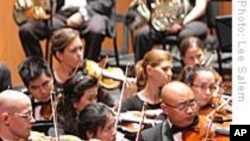<!-- IMAGE -->
In 1884, Los Angeles was a small city which had only recently gotten a rail line, telephone service, electric streetlights and a daily newspaper. But it was already home to a growing audience for the stirring emotions that only first-class musicians and singers could provide.
"A lot of boosters were building music houses, auditoriums, funding symphony orchestra concerts," archivist Claude Zachary says. "There was a real thirst for culture in those days," he adds. So the University of Southern California, then just four years old, established a music conservatory to satisfy that thirst.
International stars bring acclaim to USC
<!-- IMAGE -->
National recognition arrived 35 years later when the USC School of Music hired globe-trotting pianist Olga Steeb. An exodus of Europeans before and during World War Two brought more notable musicians to the faculty. They included atonal music pioneer Arnold Schoenberg and prolific composer Ingolf Dahl.
That generation nurtured some of today's top symphony performers, including Michael Tilson Thomas. Thomas, a composer and music director of the San Francisco Symphony, studied with Dahl in the 1960s.
Changing tastes lead to changes in the curriculum
In response to revolutions in music during the last four decades, USC's music school has diversified, says its dean, Rob Cutietta. But he's quick to add that the school has not forgotten its roots. Studio jazz classes are held down the hall from where the chamber orchestra rehearses.
[scoring] With Hollywood just around the corner, it shouldn't be surprising that about 20 years ago, the Thornton School introduced a specialization in scoring music for film and television soundtracks. This semester, the institution took another logical step when it enrolled its first undergraduates in a major called Popular Music Performance. This program teaches songwriting, performance and recording crafts to aspiring rock, folk and rap stars who hope to join other Grammy Award-winning Thornton alumni and faculty.
More musicians will create more jobs for musicians
Though it may seem counterintuitive in a time of dwindling professional music jobs, Dean Cutietta insists that music schools should produce more musicians. "If you have more trained musicians, they go into the community, they'll start community orchestras, they'll start choirs," he explains. "[If] you have people out there who are trained, they will actually increase what the participation is. It's unlike any other business model," the dean adds.
Cutietta says the Thornton school wants to graduate first-rate musicians who are ready for careers in which they'll have to mix teaching, rehearsals and promoting live performances. Graduate student Bonnie Andrews says she is prepared for a tough career. "Even students who get multiple degrees at universities in music and spend a lot of hours and time on it, very few, a small percentage get orchestral jobs or even make it. It's pretty cutthroat, it's pretty brutal," she says.
Andrews, a trumpeter, has an iPod loaded with Dvorak on the classical end and Incubus on the rock end. She says she's hooked for life on music's ability to express a spectrum of emotions. That fascination remains a genre-spanning constant in the 125-year history of USC's Thornton School of Music.





